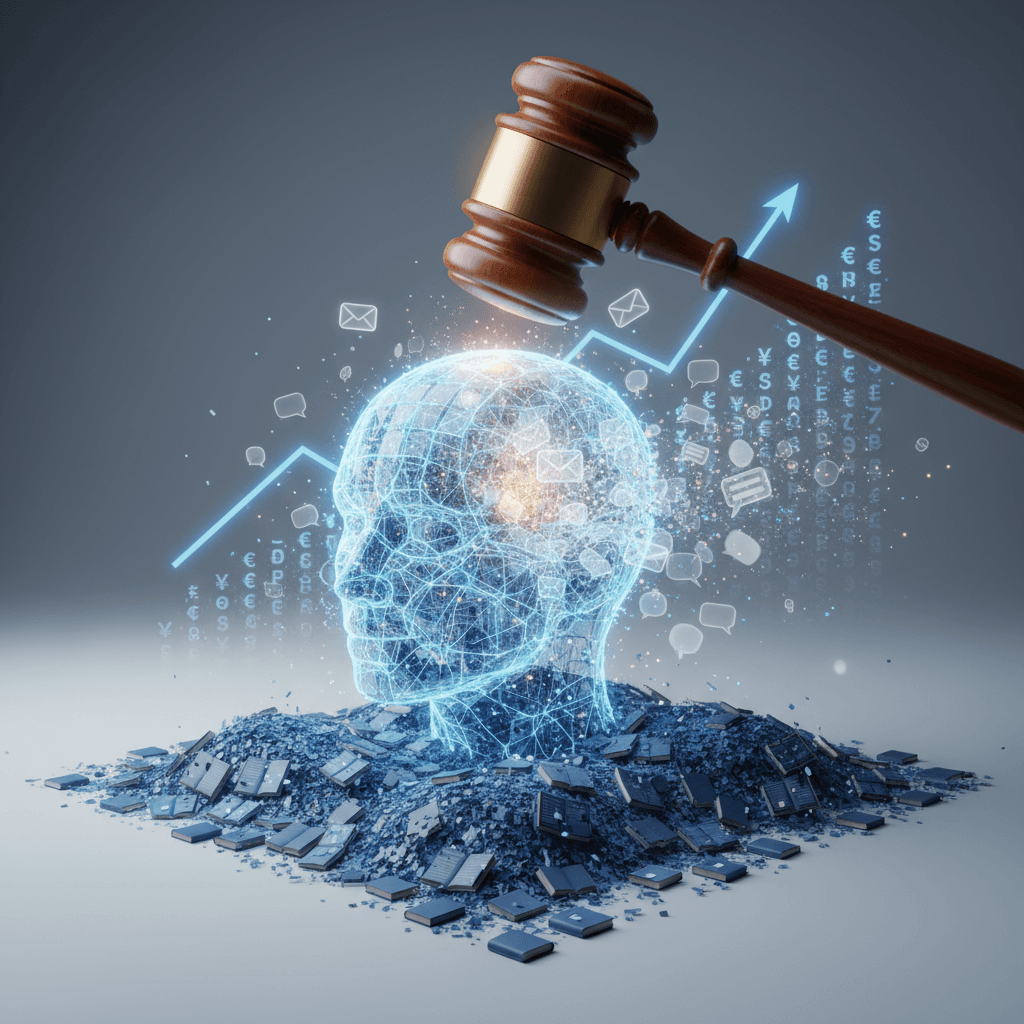Court Orders OpenAI: Expose Secret Data Deletion Chats Amid Billion-Dollar Fight
Court-ordered internal messages could prove "willful infringement," costing OpenAI billions for pirated books used in AI training.
October 12, 2025

Artificial intelligence leader OpenAI is confronting a legal firestorm that could culminate in a multi-billion dollar penalty amid explosive allegations that it used vast troves of pirated books to train its generative AI models, including the widely used ChatGPT. A coalition of authors and publishers has brought a series of class-action lawsuits, now consolidated in the Southern District of New York, accusing the company of mass-scale copyright infringement. The legal battle has intensified dramatically following a court order compelling OpenAI to disclose internal communications, including Slack messages and emails, concerning its deletion of at least two datasets believed to contain the copyrighted works. This development has significantly raised the stakes, potentially exposing the company to staggering financial liability and casting a long shadow over the future of AI development.
At the heart of the legal dispute is the contention that OpenAI knowingly used copyrighted material without permission or compensation to build its powerful large language models.[1] Plaintiffs, including prominent authors like George R.R. Martin, John Grisham, and Jodi Picoult, represented by organizations such as the Authors Guild, allege that OpenAI engaged in "flagrant and harmful infringements" by copying their works wholesale.[2][3][1] The authors argue that this unpermitted use of their creative works is the foundation of OpenAI's commercial success, enabling its models to generate texts that mimic, summarize, or even create unauthorized derivative works, thereby threatening the livelihoods of writers.[1][4] The lawsuits specifically point to "infamous 'shadow library' websites," such as Library Genesis and Z-Library, as the likely sources for the massive book corpora, referred to as "Books1" and "Books2," used in training.[5] While OpenAI has not publicly detailed the specific contents of these datasets, plaintiffs calculate they contain hundreds of thousands of titles.[5] A pivotal moment in the litigation arrived when a federal court ordered OpenAI to turn over internal communications that the company had argued were protected by attorney-client privilege.[6][7] The plaintiffs successfully argued that these discussions are crucial to proving "willful infringement," a key legal standard that could escalate statutory damages from a minimum of $750 to as much as $150,000 for each copyrighted work infringed.[8][7] Given the tens of millions of books and articles potentially involved across the consolidated cases, a finding of willfulness could translate into a financial penalty reaching into the billions.[6]
The potential financial repercussions for OpenAI are immense and represent an existential threat not just to the company but to the broader AI industry, which has largely adopted a "train now, ask for forgiveness later" approach to data acquisition. Legal experts note that the disclosure of internal messages about deleting datasets could provide a "state of mind" insight, which would be an "enormous" blow to OpenAI's defense.[6][7] The case is drawing comparisons to a similar lawsuit against rival AI company Anthropic, which settled with publishers in August for a record $1.5 billion under the pressure of a potential judgment that could have reached a trillion dollars.[6][9] Legal analysts suggest the mounting pressure and the potentially damning nature of the internal communications could push OpenAI toward a similar, colossal settlement.[6] Beyond the direct financial hit, a significant penalty or settlement could force a fundamental re-evaluation of how AI models are trained, potentially requiring companies to license all training data, a move that would dramatically increase the cost and complexity of developing advanced AI systems.[10]
In its defense, OpenAI has put forth a multi-pronged legal strategy. The company's central argument is that its use of copyrighted materials for training constitutes "fair use," a legal doctrine that permits the unlicensed use of copyrighted works in certain transformative circumstances.[11][12][13] OpenAI contends that its models are not designed to reproduce books but to learn the statistical patterns of human language from them, which it argues is a transformative purpose.[12] The company has also aggressively pushed back against the evidence presented by plaintiffs, accusing them of "prompt hacking" and manipulating ChatGPT with "deceptive prompts" to force it to regurgitate protected works.[14] OpenAI's legal team argues these outputs are "highly anomalous results" that do not reflect the typical user experience and are not indicative of widespread infringement.[14][15] Furthermore, the company has challenged the authors' claims of economic harm, arguing they have not sufficiently demonstrated that the AI's outputs are "substantially similar" to their original works.[13] In a move to mitigate liability for its customers, OpenAI has also introduced "Copyright Shield," a program that offers to cover legal costs for enterprise users who face copyright infringement claims.[16]
The outcome of this high-stakes legal battle will undoubtedly have far-reaching implications for the entire artificial intelligence industry. A victory for the authors and publishers could establish a critical precedent, affirming that AI training is not exempt from copyright law and forcing developers to secure licenses for the data they use.[10] This would fundamentally alter the economics of AI development, potentially slowing innovation but providing a new and significant revenue stream for creators and rights holders. Conversely, a ruling in favor of OpenAI's fair use argument would solidify the prevailing practice of using vast amounts of publicly available internet data for training, accelerating AI development but leaving authors and other creators with little recourse or compensation for the use of their work.[11][17] The case highlights a central tension in the digital age: balancing the rights of creators to control and profit from their work with the drive for technological innovation. As AI models become increasingly sophisticated and integrated into the fabric of society, the resolution of this billion-dollar question will shape the creative and technological landscape for years to come.
Sources
[4]
[8]
[10]
[11]
[12]
[13]
[14]
[16]
[17]